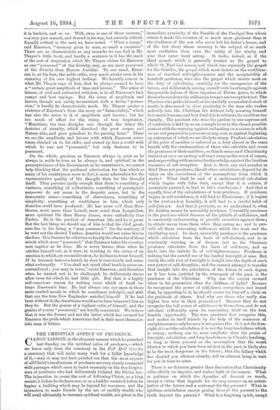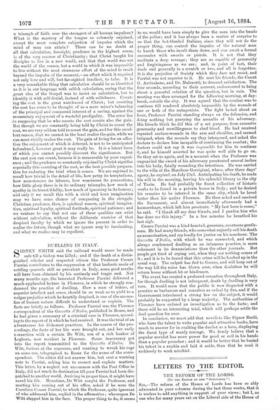THE CHRISTIAN ASPECT OF PRUDENCE.
CANON LIDDON, in the eloquent sermon which he preached last Sunday on the spiritual value of prudence,—which we know only from the summary in the Pall Mall Gazette, a summary that will make many wish for a fuller knowledge of it,—may or may not have pointed out that the most express of all Christ's inculcations of prudence are very closely connected with passages which seem to insist expressly on the free forgive- ness of penitents who had deliberately violated the Divine law. The injunction to count the cost of following Christ, as a king counts it before he declares war, or as a builder counts it before he begins a building which may be beyond his resources, and the injunction to make friends by the use of earthly wealth who will avail ultimately to increase spiritual wealth, are given in the immediate proximity of the Parable of the Prodigal Son whose return is made the occasion of so much more gladness than is the otedience of the son who never left his father's house, and of the lost sheep whose recovery is the subject of so much more exultation than even the safety of the ninety and nine that never went astray. It looks, indeed, as if the third gospel, which is generally treated as the gospel to which St. Paul had access, and which was especially the gospel for the Gentiles, the gospel which most insists on the worthless- ness of starched self-righteousness and the acceptability of heartfelt penitence, were also the gospel which insists most on the duty of calculating carefully for the emergencies of the future, and deliberately arming oneself with forethought against the possible failure of those impulses of Divine grace, to which those who ran down the utilitarian temper are too apt to trust. The Pharisee who prides himself on his carefully accumulated stock of merits is denounced in close proximity to the man who rushes ardently into the Christian life without fully assuring himself how much it means, and how fatal it is to estimate its sacrifices too cheaply. The penitent who wins his pardon by one supreme at of contrition is held up as an example to us in the closest possible context with the warning against embarking on a course in which we are not prepared to persevere at any cost, or against beginning an enterprize of which we are likely to weary. Prudent calculation of the price of sacrifice is enforced as a duty almost in the same breath with the condemnation of those who calculate and count the greatness of their sacrifices, so that it seems as if Christianity insisted at once on casting self-trust away as the worst of snares, and on providing with anxious foreknowledge against the limitless resources of self-deception. And is there any real paradox in this? Does not prudence, like all other calculations, depend for its value on the correctness of the assumptions from which it starts ? What shall be said of a mathematical calculation which begins with false data, except that it is certain, if accurately pursued, to lead to false conclusions ? And that is equally true of the calculations of true prudence. If prudence begins in self-confidence, it will lead to Pharisaism ; if it begins in the profoundest humility, it will lead to a careful habit of self-distrust. And that is precisely, as we understand it, what Dr. Liddon means by unworldly prudence. Unworldly prudence is the prudence which foresees all the pitfalls of selfishness, and is constantly endeavouring to provide securities against them ; to obtain rescue from them when they entrap us ; and to pro- vide all those renovating influences which the weak and the vacillating need. In short, unworldly prudence is the prudence which calculates from the basis of self-distrust, and so is constantly warning us of danger, just as the Pharisaic prudence calculates from the basis of self-trust, and so leads into the infinite lie of self-righteousness. Prudence is nothing but the careful use of the limited foresight of man. But surely the only root of foresight is insight into the depth of one's own power of self-deception ; and the earnest attempt to transfer that insight into the calculation of the future in such degree as it has been justified by the retrospect of the past, is the prudence of the Christian. Why was the unjust steward wiser in his generation than the children of light ? Because he recognised the power of selfishness everywhere, and hoped that, by appealing to it, he should secure for himself a claim on the gratitude of others. And why are those who really aim higher less wise in their generation Because they do not recognise the full power of selfishness in themselves, and do not calculate sufficiently upon its reasserting itself on the first feasible opportunity. The true prudence does recognise this, and makes to itself friends by the help of the mammon of unrighteousness only because it recognises this. It is not the fore- sight,rt is notthe calculation, it is not the long-headedness which is wrong ; nothing can be more emphatic than the praise of foresight, calculation, and long-headedness in Christ's teaching, so long as these proceed on the assumption that the worst illusion to which you have been subject in the past, is likely also to be the most dangerous in the future ; that the fallacy which has cheated you oftenest already, will be oftenest lying in wait for you in time to come.
There is no delusion greater than the notion that Christianity relies chiefly on impulse, and makes light of the reason. What is patience on which the Apostles all descant so much, except a virtue that depends for its very essence on an antici- pation of the future and a contempt for the present ? What is spiritual-mindedness except gazing through the present to the truth beyond the present P What is a forgiving spirit, except
a triumph of faith over the strongest of all human impulses P What is the mastery of the tongue so solemnly enjoined, except the most complete subjection of impulse which the mind of man can attain ? There can be no doubt at all that calculation, foresight, prudence in the highest sense, is of the very essence of Christianity ; that Christ taught his disciples to live in a new world, and that that world was not the world of the senses, but a world in which it was impossible
to live without the most strenuous effort of the mind to reach beyond the impulse of the moment,—an effort which it required not only love and will, but far-sighted intellect, to take. It is a very remarkable thing that calculation should be so identified as it is in our language with selfish calculation, seeing that the great idea of the Gospel was to insist on calculation, but to identify it with self-denial, instead of with selfishness. Count- ing the cost is the great watchword of Christ; but counting the cost has come to be thought of as a mere miser's balancing of the principal and compound interest of a saving, against the momentary enjoyment of a wasteful prodigality. The error lies -in supposing that he who counts the cost counts also the gain. But though we are constantly being told by Christ to count the cost, we are very seldom told to count the gain, and for this excel- lent reason, that we cannot in the least realise the gain, while we can most vividly realise the cost. The gain of living for an affec- tion the enjoyment of which is deferred, is not to be anticipated beforehand, however great it may really be. It is a latent force of which you cannot possibly discount the significance. But the cost you can count, because it is measurable by your experi- ence ; and the prudence so constantly enjoined by Christ signifies especially this counting of the cost, as the best possible prepara- tion for enduring the trial when it comes. We are enjoined to recall how trivial is the detail of life, how petty its temptations, how monotonous its labours, how wearisome its precautions, how little glory there is in its ordinary triumphs, how much of apathy in its truest fidelity, how much of ignominy iu its honour ; and only if we recall this with a vivid and keen imagination may we have some chance of conquering in the struggle. Christian prudence, then, is spiritual reason, spiritual imagina- tion, spiritual loyalty, spiritual fortitude, spiritual patience; and ;ye venture to say that not one of these qualities can exist without calculation, without the deliberate exercise of that despised faculty by which we ignore the present in order to realise the future, though what we ignore may be fascinating, and what we realise may be repellent.



































 Previous page
Previous page